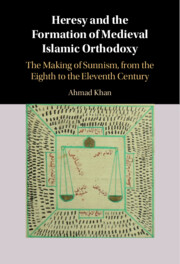 Heresy and the Formation of Medieval Islamic Orthodoxy
Heresy and the Formation of Medieval Islamic Orthodoxy from Part IV - The Formation of Classical Sunnism
Published online by Cambridge University Press: 06 April 2023
This chapter considers the implications of this study for the broader history of medieval Sunnism and comparative work on heresy and orthodoxy in the field of religious studies and history. It concludes that proto-Sunni orthodoxy was an evolving process. Not only did it undergo a number of iterations, but it was characterised by internal contradictions and divisions. The failures of proto-Sunnism were as relevant to the formation of medieval Sunnism as were its successes. Medieval Sunnism was a product of constant tensions. These required negotiations. In order to appreciate the historical achievement of classical Sunnism, examining its most contentious times is integral to making sense of its most agreeable times. In this sense, to study the formation of orthodoxy and heresy in medieval Islam is to come to terms with a truism that ‘traditions, when vital, embody continuities of conflict’.
To save this book to your Kindle, first ensure [email protected] is added to your Approved Personal Document E-mail List under your Personal Document Settings on the Manage Your Content and Devices page of your Amazon account. Then enter the ‘name’ part of your Kindle email address below. Find out more about saving to your Kindle.
Note you can select to save to either the @free.kindle.com or @kindle.com variations. ‘@free.kindle.com’ emails are free but can only be saved to your device when it is connected to wi-fi. ‘@kindle.com’ emails can be delivered even when you are not connected to wi-fi, but note that service fees apply.
Find out more about the Kindle Personal Document Service.
To save content items to your account, please confirm that you agree to abide by our usage policies. If this is the first time you use this feature, you will be asked to authorise Cambridge Core to connect with your account. Find out more about saving content to Dropbox.
To save content items to your account, please confirm that you agree to abide by our usage policies. If this is the first time you use this feature, you will be asked to authorise Cambridge Core to connect with your account. Find out more about saving content to Google Drive.